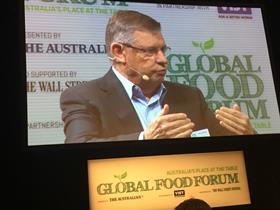
Leading Australian grower-packer-marketer Costa Group has announced a 14.5 per cent increase in first-half net profit to A$28.6m.
The result came on the back of a near 10 per cent increase in revenue in the six months to 31 December, to some A$489.4m.
Chief executive Harry Debney singled out citrus and tomatoes as the star performers among its core categories.
“These results are indicative of a strong 1H FY2018, with our citrus category continuing to make a standout contribution, fuelled by growing export demand across our key markets including Japan, the US and China,” Debney said.
“Tomatoes also made an excellent contribution boosted by the snacking segment’s performance.”
In the H1 results announcement, Costa also reported on a number of key investments to drive its further growth.
The group expanded its shareholding in Morocco-based berry venture African Blue in November, boosting its ownership to 86 per cent, from 49 per cent, in a deal worth A$68.5m.
Avocado acquisitions
Besides berries, avocado expansion is also on the cards, with Costa today announcing a conditional agreement to buy Coastal Avocados in the mid-north coast of New South Wales, a new growing region for the company. Coastal currently produces around 200,000 trays of avocados per year, a figure expanded to grow to 300,000 trays as plantings mature. It also packs a further 300,000 trays for third-party growers.
Costa announced two further avocado acquisitions were completed as of January, including the Gunalda avocado farm in Central Queensland and Burness avocado farm in Far North Queensland.
“As a result of these acquisitions, Costa will, on completion of the Coastal Avocados acquisition, have a production and supply footprint stretching from February through to December,” said Debney. “We are now well under way to executing our strategy to build avocados into our fifth core vertically integrated produce pillar and to ultimately achieve 52-week supply.”
The new avocado acquisitions, together with recent additional plantings, are set to take the company’s total plantings to around 679ha with a presence in four growing areas across three states and packhouse facilities in each region. They bring Costa’s investment in the avocado category, in conjunction with Macquirie Agricultural Funds Management, to A$110m, as the group bids to become “the market leader” in the next three years.
Acquisition activity in Australia was not limited to the avocado categrory, with Costa also completing the purchase of citrus operation Impi Orchards in December. The operation includes 77ha of citrus plantings, with a further 65ha of development land, producing a mix of oranges, mandarins, grapefruit and lemons.
“This now brings Costa’s total citrus plantings to around 2,240ha, which are all located in the Riverland region,” said Debney, who confirmed that Costa “maintained an active interest in M&A opportunities in the citrus industry”.
Elsewhere, Costa reported on the ongoing successful execution of its domestic berry growth programme in Australia, where it has added 95ha of new plantings in 2018.
The group also said its investments in berry operations in China remained on track, despite a challenging summer with wet weather hampering production. The company is planning a 65ha expansion at its new Manhong site for 2019.
Positive outlook
Costa said it now expects full-year net profit to grow by around 25 per cent, up from previous guidance of at least 20 per cent.
Full-year earnings would be more heavily weighted to the second half of the fiscal year, the company said, due to the timing of the avocado harvest and further growth of international operations, including the consolidation of African Blue in December 2017.
The earnings forecast includes a contribution from Costa’s acquisition of African Blue. Costa’s purchase of a further 37 per cent shareholding of the company prompted a revaluation of the 49 per cent stake it already held. A $40.1m non-cash gain on the revaluation increased Costa’s statutory net profit for H1 to A$66.2m.
The company raised its interim dividend of 5 cents per share, fully franked, up 25 per cent on FY17.



